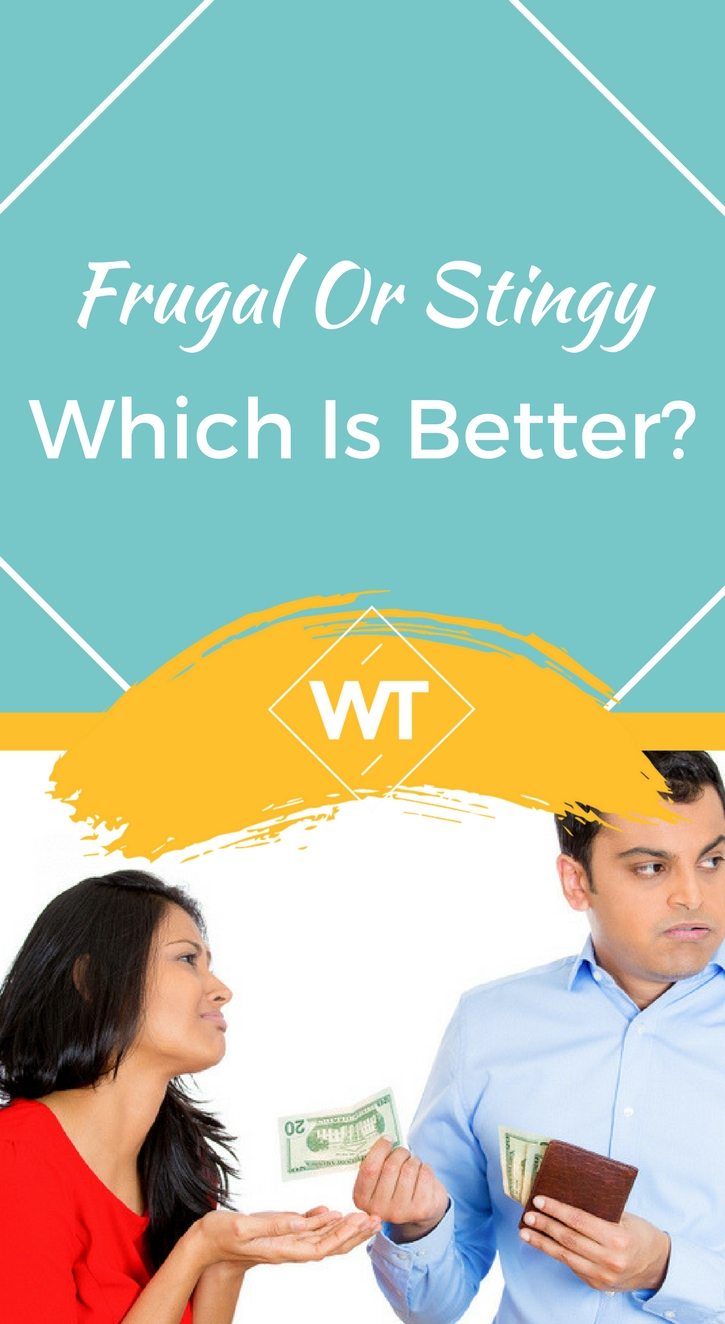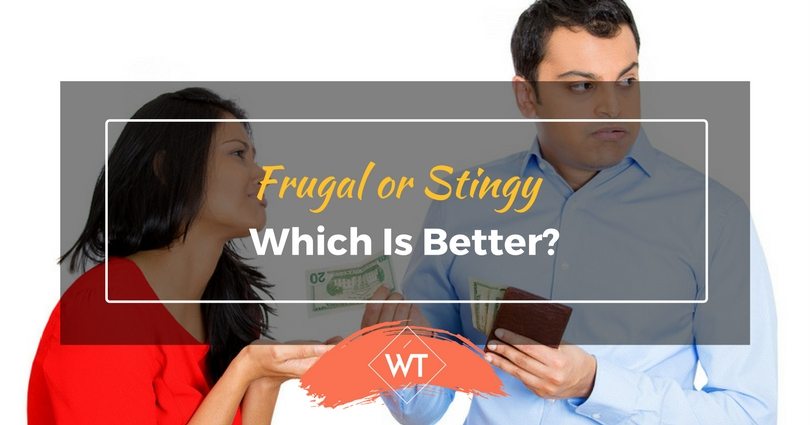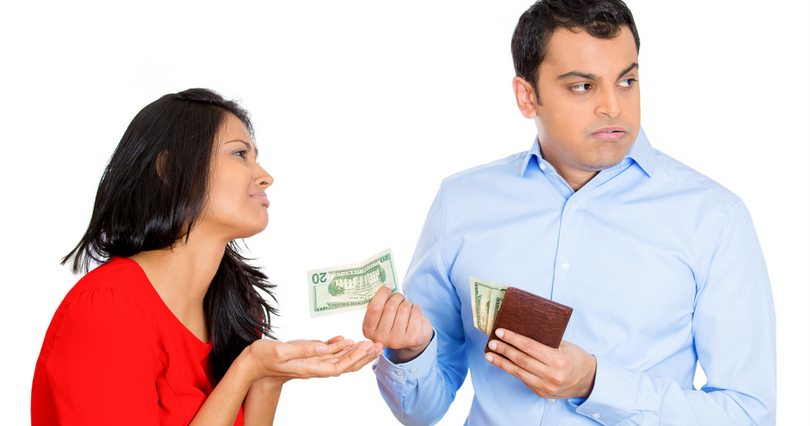Frugal or Stingy – Which is Better?

Adjectives can be highly subjective in nature because different people look at it in various ways. These words can be seen as good or bad based on the perception of an individual about a characteristic depending on the situation or context. Frugal or Stingy are the words seen as a characteristic of an individual. Controlling expenses and saving more is the most important step required to achieve our financial goals.
Being frugal could be viewed as negative, but frugality is not bad at all times, probably the extent of frugality is what matters depending on the context or situation However, the word ‘stingy’ is obviously a bad trait.
When it comes to spending or managing finances being prudent about how you spend your money is an essential step to reach your financial goals.
Being frugal can be good at times (which can be called ‘prudent’), but when you try to be too frugal, you become ‘stingy’ or ‘miserly’, which is bad.
Now let’s put the words and language and move to the main essence of the topic. Let me give you an example of being stingy.
A Case of Being Stingy
There was a person named Jay (fictitious) who used to save every penny he earned. He had a small family – a wife and a son and lived in a small house and had a decent life to live. He was also earning a decent sum, and managed to save and invest in good avenues.
So where is the issue? Jay used to cut corners everywhere right from the morning cup of coffee to the occasional family vacation. He also avoided buying a car, saved on milk, coffee, groceries, etc. This family does not have a personal computer at home, in today’s technology age where most middle class families have broadband connectivity.
In addition, Jay also avoids wearing good shoes, apparels, etc. and is also against the idea of buying a bike for his son. His son is also deprived of going out or pursuing activities or hobbies other than academics or reading books. What kind life is this?
So this example shows how extreme frugality or stinginess can make one’s life miserable and also have a huge impact on the family and relationships.
Being Frugal (in a prudent way)
There is another case of Mr. Ryan who is frugal but not miserly. He avoids going to the large swanky malls and visits a movie theatre 3-4 times a year at the most. He does not have designer clothes or branded stuff like his peers although he buys a few branded stuff if necessary.
Interestingly, he carries a credit card most of the time with him, but seldom uses it. This is another example, but far better than that of Jay.
Ryan has a car for his personal commutation and convenience. Occasionally he goes out with his family to dinner or for an outing. He also encourages his daughter to pursue her dance classes and other activities with some control.
Now we have seen one bad example and one good example in terms of how frugal or stingy one can be. Now if we look at a diametrically opposite direction we can have another set of people who are ‘Lavish’ or have the bad habit of overspending.
I don’t need to give an example here as we have all seen people get in to bad spending habits all the time – whether it is buying unwanted stuff or overspending on credit card, etc.
The most important question is “How do I figure out if I’m stingy or reasonable?” If we try to crack this question step by step we would be able to solve the problem at the root level.
Classifying Expenses
The first step in understanding what is good and bad is to know the bigger picture in a holistic way. Try to classify your expenses in to three types:-
- Necessities/Essentials
- Partly Discretionary
- Discretionary (avoidable)
The first and third category are obviously quite opposite in nature.
Necessities are absolutely essential and cannot be avoided, but one can take steps to cut costs to an extent. E.g. Food, clothing, shelter as well as some basic needs such as utilities – gas, electricity, etc. One cannot compromise on these things because life will come to a stand still without these.
The next category – partly discretionary expenses are those which may appear essential but one can live without these. However, these may be required because of their utility or usefulness. For example furniture, car, a gadget, appliance, etc.
For instance buying a washing machine to save time and effort involved in washing clothes can be a good utility but it can be postponed if expensive, or you could also think about hiring a maid instead of buying a washing machine if that works out better in saving time and effort on most house hold chores.
Discretionary expenses are purely consumption expenditures which can be best avoided. They are not bad all the time, but they have lesser utility or value in tangible terms, but they may give you an intangible value or benefit in terms of happiness, a good feeling, nice experience, etc. E.g. Going to a movie theatre, entertainment, shopping at swanky stores, partying, etc.
These expenses are purely meant to satisfy your emotional needs. These can also be termed luxury in some cases where one spends beyond one’s means.
Judging whether this is partially discretionary or fully discretionary is difficult and one has to make a careful judgment given one’s priorities. People who cut down on essentials would be termed ‘stingy’, but those who smartly cut down on discretionary expenses are thrifty (frugal) and smart.
Indulgence – Is it bad?
This is a difficult question to answer, but try to minimize the discretionary expenses as far as possible. Occasionally indulgence which does not pinch your finances is acceptable, but overindulgence can bring more misery later on.
Ideally expenses related to indulgence (discretionary expenses) should not exceed 15% of your income, but keep it much below this level. There can be a few exceptions such as family vacations, outings and other entertainment that happens in rare occasions.
There are many women who like to look their best and spend a lot on cosmetics, beauty and related items. Now visiting a beautician once a month is still okay but if you are going to do this every weekend probably you are over doing it.
Similarly going on vacation twice or thrice a year is good and enjoyable, but going on vacation every month is over indulgence, which has to be cut down as soon as possible.Further, there are many people who think they should be buying designer stuff all the time are actually in to wrong indulgence. Instead they should smartly mix and match designer, branded with non-branded and cheaper stuff too.
For instance if you want to buy a pair of pajamas where do you go? –
- designer shop or
- a small apparel store or
- a street side outlet
Obviously the small apparel store will be the option chosen by most people.
However, don’t be surprised to see a few people heading to the most swanky showrooms or (online designer stores) to buy even basic apparel. Some of them could afford to do that, while some are just overspending several hundreds or thousands, which they can save by buying from the right place.
However, most advertisements want you to believe that their unique product is the best for you. Some advertisements show that your status symbol or appeal among your peers will improve by using product X or Y, which are pure marketing gimmicks.
Even if the product were to be the best they are going to give it to you at a hefty price and make money on that. Its all business not charity. Remember this when you get attracted to a branded product. Indulgences beyond a reasonable limit can become obstacles to achieving your financial goals or even lead to misery or bankruptcy.
Understand Value for Money
There is nothing wrong in buying good things when you can afford them, but make sure you are getting value for money. A branded product offers certain value, while a non-branded product can also offer equal or better value if you compare quality and price.
Most branded stuff is expensive due to the huge advertising expenditure, research and development expenditure, distribution costs, trademark and related costs as well as cost of packaging, storage, etc. The list of costs that are added to a branded product can be endless.
Of course not all branded stuff is expensive. If you take some branded stuff such as soaps, stationary, etc you can still get cheaper deals from established brands. This is because these are pure commodities. Buy products or even brands that give you value for money.
Be Frugal and Be Positive
Being frugal is not bad . Most people may try to tease you for being a ‘miser’. But in reality people who are stingy are the real ‘misers’ because they are making life miserable.
Being frugal or thrifty is actually a good trait, which helps you to keep an automatic control over your budget. Most frugal people know their budget approximately without maintaining any records, because their spending is only restricted to a dozen odd items.
However, for the lavish spenders a budget is necessary but becomes a more painful and cumbersome process because they have several dozens of items to record in their budget.
They have a dozen expenses or even more in the discretionary category, and the amounts can be very high at times, which makes it difficult to know where most of the money is going. Being frugal is a good trait which most people should have.
Even the world’s largest legendary investor Warren Buffet is known to be highly thrifty when it comes to his personal spending. Mr.Buffet, who owns a private jet company can easily afford to have private jet for himself, but prefers to drive on his own car. When billionaires can be thrifty it is even more important for common people like us to be frugal.
If you want to reach a target of one million or five million you have to workout your finances and plug all loopholes. Short term indulgences will become a big obstacle in your path to achieving important financial goals. Controlling expenses and saving more is the most important step required to achieve your financial goals.
Once you cross this step you will have more savings or resources to invest for the future and achieve the most important goals of your life.









Leave a Reply